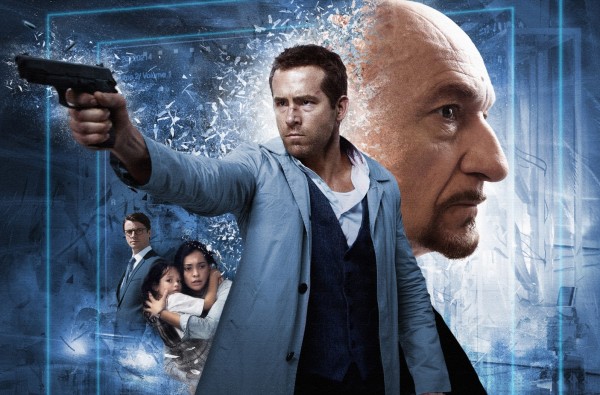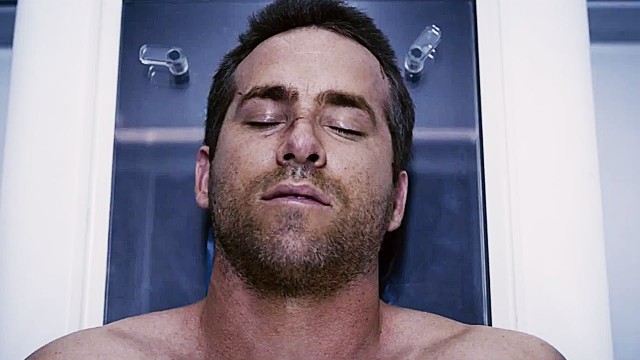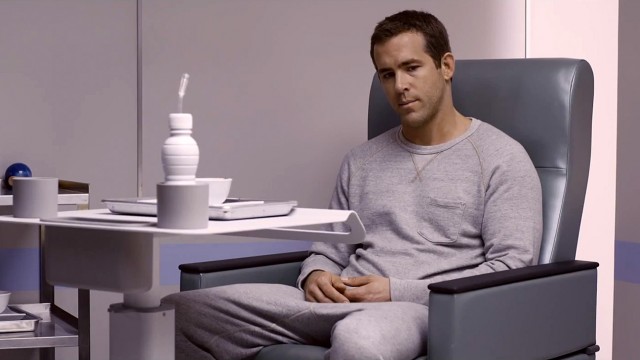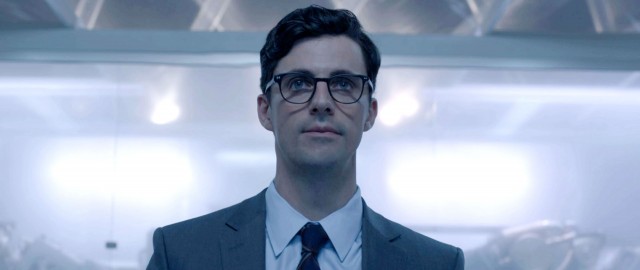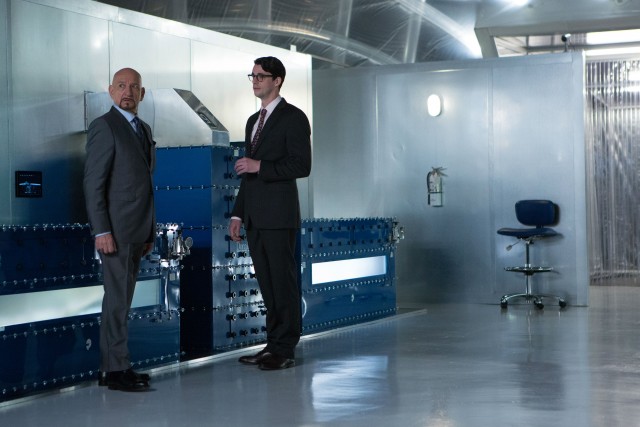Self/less is a criminal waste of a good idea. Despite the nobility behind the movie being an original concept that’s not inspired by any previous media, and touching on many impressive themes that would have been right at home in a high-concept sci-fi thriller like this, Self/less quickly gets lazy, and does absolutely nothing with its grand foundation. It’s an extremely frustrating waste of potential that really deserved better.
Making matters worse is the fact that Self/less assembles some surprising talent, namely in its duo of leads, Ryan Reynolds and Sir Ben Kingsley, yet completely squanders said talent. Kingsley isn’t even in the movie at all past the first act, leaving Reynolds to carry what’s largely a thankless part, with his character eternally stuck in the shadow of an actor with far more history and depth. It’s a terrible situation for all involved, and it’s a shame that Self/less couldn’t find a more sensible union of actors to share a lead role.
Perhaps the greatest crime of all in Self/less however is the fact that it’s a complete bore. The movie tries to incorporate half-baked action scenes to compensate for a general lack of direction, and some surprising shallowness on top of that. This is why it’s small wonder that the movie has gone on to be one of this Summer’s worst box office bombs, having a meager budget of just less than $30 million, and not even making half of that back at this point. Adding insult to injury is the fact that Self/less was meant to revive the Gramercy label of Focus Features, spearheading an initiative by Focus to create more thought-provoking sci-fi and horror movies. It seems in the end though that even Focus’s parent company, NBCUniversal knew that Self/less was a bad movie, since they apathetically tossed it into the crowded July calendar alongside Universal’s own surefire moneymaker, Minions, essentially marching Self/less off to die at the box office.
There’s a good movie screaming to get out here, but all that’s left is a whole bunch of lost potential. Given that July is packed with many far superior movies this year, you’re definitely better off skipping Self/less in favour of something far more effective and entertaining.
Self/less stars Ben Kingsley and Ryan Reynolds as Damian Hayes, an extremely wealthy man who is dying of aggressive cancer. Damian is tipped off by a mysterious person to a cutting-edge medical firm that has pioneered a technology called ‘shedding’, which allows a person to place their mind in a younger body, and essentially ensure that they can live longer, if they have enough money, and still have some sort of potential to fulfill.
Given the fact that the inciding incident involves a body switch, Kingsley is dropped rather early in the movie. That’s disappointing, since Kingsley is one of the movie’s best actors, and is definitely a more credible lead in a movie like this in contrast to Ryan Reynolds. Reynolds has proven that he can do drama, granted, but he’s ill-suited to a cerebral thriller of this nature, and when paired with Kingsley especially, Reynolds just feels miscast. It feels like the filmmakers wanted a younger, famously attractive actor most of all, and were willing to settle in terms of someone actually being able to stack up to Ben Kingsley of all people.
The fact that there’s such a huge dissonance between the acting styles of Kingsley and Reynolds immediately puts the movie at a disadvantage. It’s impossible to believe that these two men are the same person, and that makes the core conflict behind the story ring hollow. Reynolds tries really hard at first, but later in the movie, he just seems like he’s sleepwalking through his performance. Even before that though, Reynolds tosses in his reliable pretty boy wit and devil-may-care disposition to try and jumpstart his character after the switch, which Kingsley did not at all demonstrate in the first act. Kingsley portrays Damian as a world-weary man that knows too much, and is burdened by regret as a result, while Reynolds then shifts gears into a slightly dunderheaded pretty boy hero who knows too little, and comes off as a naive fool. It creates dramatic whiplash, and it’s one of the main ways that Self/less quickly falls apart. Even when the movie tries to have Reynolds interact with the daughter that Kingsley apparently became estranged with, it just doesn’t work, because Reynolds isn’t convincing as a world-weary old man in a young person’s body.
Matthew Goode meanwhile plays the catalyst to events, Albright, the protegee of the pioneer of shedding who oversees Damian’s procedure, and the twist with this character is insultingly obvious. Albright is an emotionless brick, and after seeing Goode’s previous feature film role be a standout turn in the Oscar-winning The Imitation Game, it really just looks like Goode is collecting a cheque here. Delivering his lines with no enthusiasm or conviction, Goode’s villain is one of the blandest personalities in the movie. Albright at least has a body-hopping henchman that gives it his (their?) all and manage to be more interesting, but our main antagonist is a complete snore, unfortunately.
On the other hand, Natalie Martinez and Victor Garber deliver satisfactory supporting performances, as key allies to Reynolds’ Damian and Kingsley’s Damian, respectively. Garber even has some story development later in the movie that’s actually kind of shocking and smart. Still, even they can only do so much with a script that just doesn’t care about capitalizing on its big ideas, and after the big twist with Garber’s character, he’s also dropped for the rest of the movie, with a complete lack of resolution for his story arc to boot.
Ultimately, most of the cast fails to make an impact, and you’ll forget all about pretty much every performance by the time you leave the theatre.
Self/less sets out with a great concept behind it, which is why it’s very unfortunate that it does nothing with said concept. The movie sets up an intriguing premise for a sci-fi thriller, where a dying man places his mind in a homegrown younger body, then finds out that the body actually belonged to another person who gave his life for the procedure. This is a fantastic premise in terms of making a thriller that could have been both entertaining and thought-provoking, but unfortunately, the story in Self/less is neither.
The movie has to really strain to get its premise into place. Even after the body switch is made, it has to then strain again to create an outlandish scenario that not only motivates Damian to nose in to the affairs of people he doesn’t know and has no reason to help, while also motivating him to blatantly ignore instructions for his treatment for whatever reason, but also get into such a position to bring out the worst in the people who placed him in the new body, and suddenly turn them into strangely powerful and heavily armed killers. Frankly, this kind of sloppy writing feels like the kind of stuff a high school student would concoct, and it has absolutely no basis in the real world, as much as the movie likes to think it’s addressing a real-world issue.
That’s the other big problem with Self/less. It raises questions about a theoretical ethical dilemma in terms of weighing lives and pushing the boundaries of science, acts like it’s so smart and ahead of the curve, then makes absolutely no effort to ground itself in reality. Rather, the movie brings up a bunch of questions that it clearly doesn’t have answers for, then doesn’t even try to answer them. Instead, it tries to awkwardly switch gears into being a prolonged thriller where its lead has to go on the run with a stranger and her daughter, then simply throws up its hands with an abrupt, half-assed conclusion afterward, one that doesn’t really tie up very much.
Optimistically, the movie bit off more than it can chew with its story, but pessimistically, it clearly doesn’t care. For a movie that wants so badly to be smart, this story ends up being pretty brainless.
It’s shocking to consider that Tarsem Singh of all people directed Self/less. Yes, the same Tarsem Singh behind The Cell, Immortals and Mirror, Mirror directed Self/less, a movie so bleakly devoid of style that it comes off as positively draining to look at. Sure, Singh’s previous work was mostly style and very little substance, despite his tendency to drown everything in overblown dime store symbolism, but at least his former movies were visually interesting.
To be fair, Self/less at least starts out with some interesting visual direction, when Ben Kingsley is headlining the story. Singh’s direction is done in such a way as to emphasize Damian’s opulence in some clever fashions, and he does make the shedding facility have a nicely cold, haunting atmosphere when the movie first explores it.
As soon as Reynolds takes the reins though, and Singh is unable to work within his flashy wheelhouse, he just seems to step back and not really do anything. The only time that Singh’s influence is noticeable past the first act is in a bunch of muddled hallucinations, which are neat at first, but are quickly over-used, and become an insulting way to remind viewers that something is wrong, as if we somehow forgot. I understand if Damian was actively trying to resist doing the right thing, and just revel in his younger body indefinitely, but that’s not the case. When Damian acts against logic and reason to stick his nose where it doesn’t belong, the hallucinations just become obnoxious and unnecessary. If he’s going to disturb the illusion of his own accord, then we don’t need the annoying visual cues that he’s disturbing the illusion!
Still, when even Tarsem Singh mostly can’t be bothered with directing listless and thankless action scenes, on top of flaccid, mostly detached character interactions, you know you have a problem. I almost wish that Self/less had ended up being one of Singh’s trademark head trips, because then it might have at least been a little more memorable.
Self/less is a lethargic thriller that completely betrays the potential of its great concept. Its poor pairing of actors is undermined at every turn by a dull, self-important script, and direction that mostly can’t be bothered past the first act. Rather than making audiences think about the advancement of science or the value of life, Self/less does a much better job of killing brain cells.
Further working against Self/less is the fact that it has zero appeal in contrast to the many more entertaining blockbusters that you could spend your money on this July. Even with the month’s movie releases not all being made available yet, we already have Trainwreck and Ant-Man especially standing as far superior character examinations, and all-around way, way better movies. Even Minions and Terminator: Genisys carry quite a lot of added entertainment value over Self/less, ironically coming off as smarter movies, simply because they know what they are, and don’t pretend that they’re any more intelligent than what they are. June had some particularly fantastic movie releases that are still happily screening in theatres as well, namely Spy, Jurassic World and Inside Out, giving Self/less even less of a leg to stand on in terms of drawing moviegoers’ attention this month.
Frankly, this disappointment is better off fading into obscurity. Self/less set out with promise, but its final product is a tedious exercise in slow pacing and shallow, sloppy storytelling. Singh and co. had best just shed this project themselves, and hope that the next body of work they end up in doesn’t have so many issues with it.

